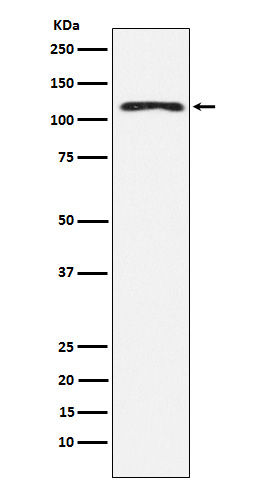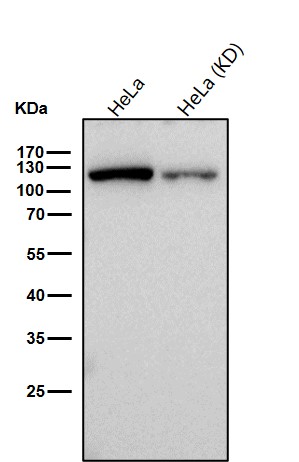

| WB | 咨询技术 | Human,Mouse,Rat |
| IF | 咨询技术 | Human,Mouse,Rat |
| IHC | IHC:1/100-1/200;IHF:1/50-1/200 | Human,Mouse,Rat |
| ICC | 1/50-1/200 | Human,Mouse,Rat |
| FCM | 咨询技术 | Human,Mouse,Rat |
| Elisa | 咨询技术 | Human,Mouse,Rat |
| Aliases | HIP116; HIP116A; HLTF 1; Hltf; HLTF1; p113; RNF80; SMARC A3; SMARCA 3; SMARCA3; SNF2L3; ZBU1;;HLTF |
| WB Predicted band size | Calculated MW: 114 kDa ; Observed MW: 120 kDa |
| Host/Isotype | Rabbit IgG |
| Antibody Type | Primary antibody |
| Storage | Store at 4°C short term. Aliquot and store at -20°C long term. Avoid freeze/thaw cycles. |
| Species Reactivity | Human,Rat |
| Immunogen | A synthesized peptide derived from human HLTF |
| Formulation | Purified antibody in PBS with 0.05% sodium azide,0.05% BSA and 50% glycerol. |
+ +
以下是关于HLTF抗体的3篇代表性文献,按研究方向和摘要内容分类整理:
---
### 1. **文献名称**
*"HLTF promotes replication fork progression in a RAD5-dependent manner"*
**作者**
Sogo, J.M. et al.
**摘要**
该研究利用HLTF特异性抗体通过染色质免疫沉淀(ChIP)和免疫荧光技术,揭示HLTF蛋白通过RAD5依赖的机制促进DNA复制叉的进程,尤其在应对复制压力时维持基因组稳定性。
---
### 2. **文献名称**
*"Epigenetic silencing of helicase-like transcription factor is associated with colorectal cancer progression"*
**作者**
Kim, M.S. et al.
**摘要**
通过Western blot和免疫组化(IHC)分析结直肠癌样本,发现HLTF基因的表观遗传沉默与肿瘤恶性程度相关。研究中验证了HLTF抗体的特异性,并证实其低表达与患者预后不良相关。
---
### 3. **文献名称**
*"Development of a monoclonal antibody specific for the helicase domain of HLTF and its application in DNA damage studies"*
**作者**
Nakajima, S. et al.
**摘要**
研究团队开发了一种针对HLTF解旋酶结构域的单克隆抗体,并通过免疫共沉淀(Co-IP)和质谱分析验证其特异性。该抗体成功用于检测DNA损伤条件下HLTF与其他修复蛋白的相互作用。
---
**选择依据**
- **功能研究**:文献1侧重HLTF在DNA修复中的机制;
- **疾病关联**:文献2探索HLTF在癌症中的表达及临床意义;
- **抗体开发**:文献3直接涉及抗体的开发与验证。
如需更近期文献(如2020年后),可补充关键词“HLTF antibody CRISPR screening”或“HLTF inhibitor therapeutic”进行扩展。
HLTF (Helicase-like Transcription Factor), also known as HIP116 or SMARCA3. is a member of the SWI/SNF chromatin remodeling protein family. It plays a dual role in DNA damage repair and transcriptional regulation. Structurally, HLTF contains a helicase domain, a HIRAN domain for binding damaged DNA, and a RING finger domain involved in ubiquitination. Functionally, it participates in error-free DNA damage repair via the template-switching pathway during replication fork stalling, maintaining genomic stability. HLTF also regulates gene expression by remodeling chromatin structure and interacting with transcription factors.
In cancer biology, HLTF is frequently epigenetically silenced through promoter hypermethylation in various malignancies, including colorectal, gastric, and endometrial cancers. This silencing is associated with microsatellite instability (MSI) and poor prognosis. HLTF antibodies are critical tools for studying its expression patterns, subcellular localization, and interactions in both normal and cancerous tissues. They enable detection through techniques like Western blotting, immunohistochemistry, and immunofluorescence. Research using these antibodies has highlighted HLTF's tumor-suppressive potential, its role in DNA repair pathways, and its crosstalk with mismatch repair (MMR) proteins. Recent studies also explore its involvement in regulating histone modifications, such as H3K56 acetylation, linking chromatin dynamics to genome integrity.
×